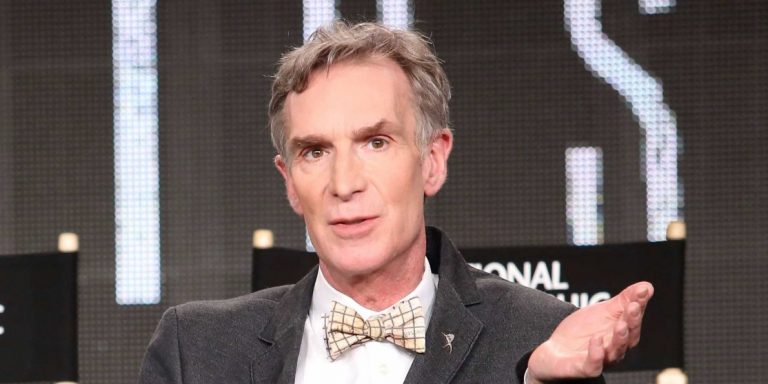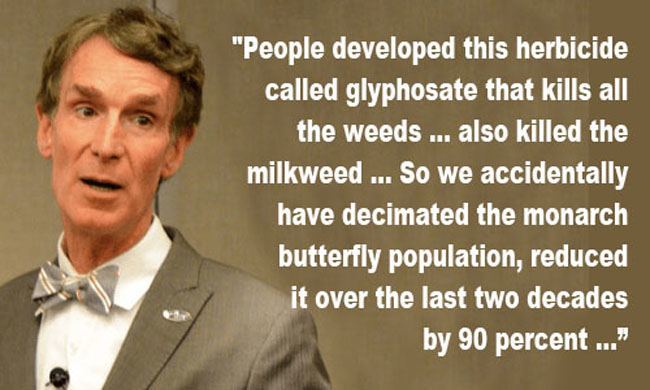Most people know Bill Nye for his role on his famous kids science show ‘Bill Nye the Science Guy,’ but lately he’s been receiving quite a bit of media attention for his views on topics such as space exploration, evolution, and more, including genetically engineered foods.
When Nye’s thoughts on GMOs first hit the press, he expressed his fervent support for GMO labeling. Then, Nye took a personal visit to Monsanto headquarters, came back and suddenly began to change his tune and suddenly supported the crops.
Now, Nye has released a full episode of follow-up comments on his GMO stance as part of a radio show appearance with co-host Chuck Nice.
And while he hasn’t changed his mind completely, he has admitted that Monsanto may be essentially responsible for the decimation of one of the country’s most iconic insect species, the monarch butterfly.
Nye Admits Glyphosate is Decimating Monarchs…

Glyphosate, the main ingredient in Monsanto’s flagship Roundup weedkiller, has been called a probable human carcinogen by the World Health Organization and is now sprayed en masse on genetically engineered crops designed to withstand them in a laboratory.
Aside from the widespread risk of cancer and disease this poses, beneficial insects are being wiped out, as Nye admitted on the show according to this article from EcoWatch.com:
“People developed this herbicide called glyphosate that kills all the weeds, and kills all of everything except the plants that have this cool gene in them that allows them to grow right through it,” Nye said. “We also killed the milkweed, and the milkweed is what the monarch butterflies rely on. So we accidentally have decimated the monarch butterfly population, reduced it over the last two decades by 90 percent … We don’t want that where you are accidentally wiping out a potential pollinator species.”
He also spoke out about the risks posed by monoculture farming, which is practiced across the U.S. to grow massive amounts of GMO corn for ethanol use, feeding animals, and making processed foods.
“And the other unintended consequence [is] monoculture farming. Enormous tracts of a single type of plant make it very hard for bees, as pollinators, to get the job done,” Nye said. “They got to go there, do that one crop, then there’s nothing to do. And somebody puts them back in a box and puts them in a truck and takes them to a different crop, and they just get beaten up, they can’t handle it.”
Nye went on to say that there is “good and bad” in regards to this system of agriculture, and then went on to justify it by saying that the world is at 7.2 billion people currently with the number projected to rise to 9.2 billion; “so you’re going to have to do something to feed them,” he continued (editor’s note: the UN has already said that small-scale natural farming is the way to feed the world, not GMOs, and the world throws away roughly half of its food indicating that production is not the problem, which makes Nye’s comments especially surprising).
Additional GMO Comments
While admitting the adverse environmental effects of the current farming system, Nye also continued his support for GMOs in regards to their production capabilities.
In addition, he went on to say that the Non-GMO movement has its place, saying “we’ll let the marketplace sort that out..” when asked about whether organic can be “economically competitive” or not. For more on Nye’s comments and to listen to his radio show, you can check out the full EcoWatch article by clicking here (via MarchAgainstMonsanto).

